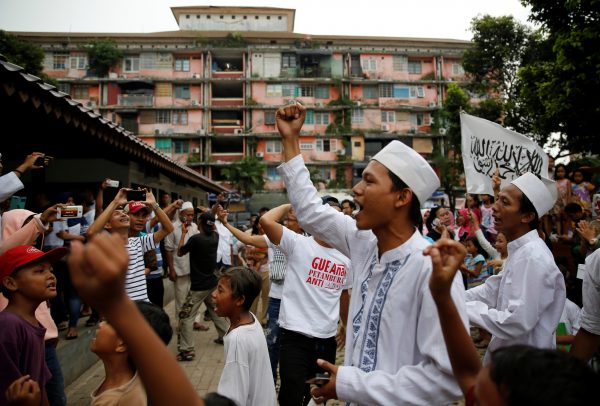Anies unseated Ahok despite having ‘jumped ship’ multiple times, first from former president Susilo Bambang Yudhoyono’s Democrat camp to a supporter of President Joko Widodo’s (Jokowi) Democratic Party Struggle (PDIP) and finally to Prabowo Subianto’s Gerindra Party.
For Jokowi and the PDIP, a victory for Ahok was important to block the possible rise of a new presidential contender. Now that Anies has won — at least by unofficial results — many wonder what his future political ambitions may be.
But any presidential bid by Anies would be difficult if Prabowo decides to face Jokowi again in the 2019 presidential elections. This would relegate Anies’ prospects to that of running mate. Regardless of future election bids, Anies’ victory on the Gerindra ticket greatly strengthens the party’s role as the parliamentary opposition and challenger to the Jokowi administration.
Anies’ victory has also shown that ‘playing the religion card’ — despite disappointing many of his admirers — was an effective political move against Ahok. Although Ahok was an incumbent with a strong track record, support from the majority coalition in parliament and close ties with mainstream media moguls, he became controversial when he was recorded making questionable references to a Quranic verse that provoked the Muslim electorate.
After a series of massive rallies against Ahok, his popularity slumped. He was subsequently charged with blasphemy and is facing trial. Nonetheless, Ahok — who is an ethnic Chinese Christian — still emerged as the leading candidate in the first round with 43 per cent of the vote.
Indeed, the mobilisation of religious issues nuanced the election. Some mosques in Jakarta openly refused to extend burial rites to those who supported or voted for a blasphemer, which was an indirect reference to Ahok.
Anies, for his part, is known as a progressive Muslim figure, although he seemed comfortable with a more conservative line during the campaign. While one survey by Saiful Mujani Research and Consulting (SMRC) showed that only 16.7 per cent of Jakarta’s population voted along religious lines, every vote counted. The SMRC survey showed that 32.4 per cent of Anies’ voters voted for him based on religion.
Given how tight the race was, all candidates resorted to patrons within their political party machineries for support in capturing undecided voters.
Ahok turned to Megawati, chief patron of the PDIP, who openly endorsed him and his running mate Djarot. For Megawati, an Ahok–Djarot victory was important to entrench PDIP’s position as the leading party. Megawati personally ordered PDIP members to defend Ahok after the controversial video went viral.
Former president Yudhoyono, for his part, openly endorsed his son Agus Yudhoyono as a candidate in the first round of the election, perhaps with a view to building his own political dynasty as his Democratic Party enters a decline. But his endorsement backfired after high profile social media attacks on Yudhoyono.
As for Prabowo, he has openly declared that he is likely to contest the presidency in 2019. Although Anies might not run as his vice-presidential candidate, Prabowo’s support was enough to increase his public presence as a step towards 2019, should he decide to contest. Prabowo has shown that he is not to be discounted — a substantial portion of Anies first-round 40 per cent of the vote was thanks to Prabowo’s influence.
Having these old political figures actively endorsing each favourite pair of candidates indicates that the Jakarta election was very much an avenue for them to advance their respective interests.
Anies’ victory is earth-shaking for Jokowi’s fluid coalition as it opens the door for another nexus of power to emerge. Moving forward, the opposition led by the Gerindra Party will likely start to raise issues to undermine the cohesion of Jokowi’s coalition. After Ahok’s defeat, Jokowi will now have to drive a hard bargain to keep his coalition members from gravitating towards either opposition camp.
Emirza Adi Syailendra is a Research Analyst with the Indonesia Programme at the S. Rajaratnam School of International Studies (RSIS), Nanyang Technological University, Singapore.
A version of this article was originally published here by RSIS.

